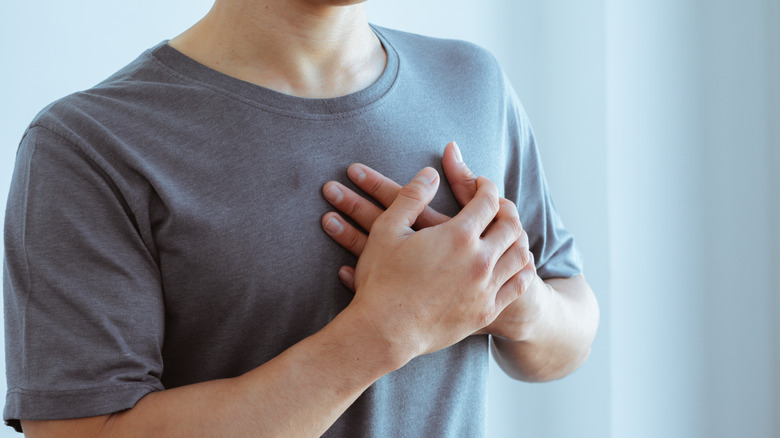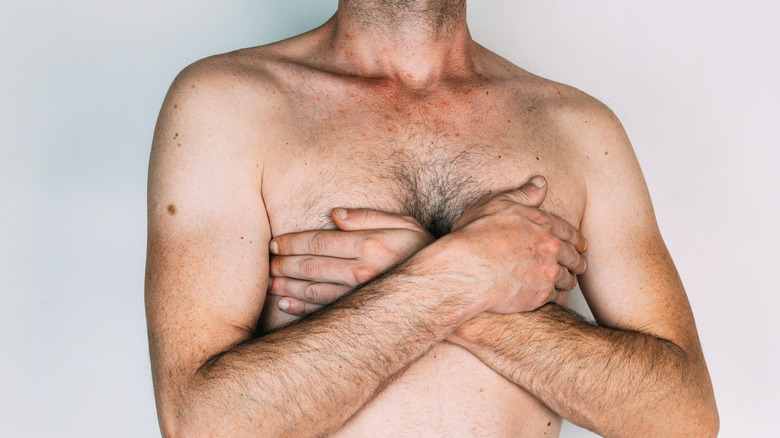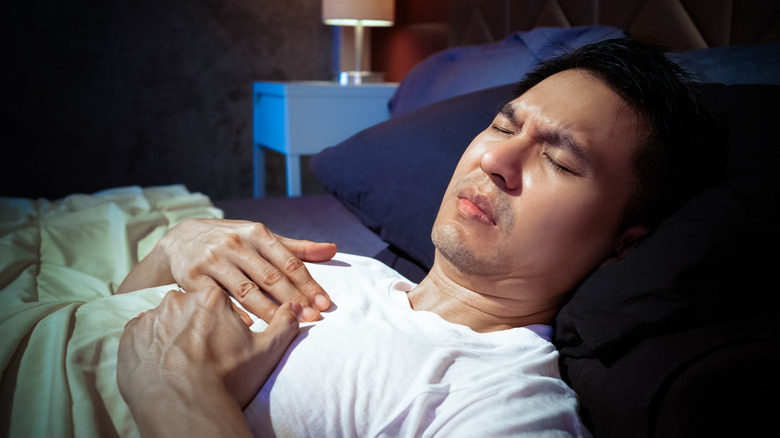Surprising Causes Of Breast Pain In Men
Men have breast tissue, although it's not as pronounced as women's and it doesn't produce milk. Still, they can experience pain in their breasts too. There are various causes of pain in male breasts, from minor problems that go away on their own to more serious ailments that require diagnosis and treatment.
One common cause of pain in the area is not actually due to the breast tissue itself, but to the chest muscles — the pectoralist major and pectoralist minor — or to the tendons (per Healthline). Heavy lifting, such as bench presses, that require the use of these muscles may result in chest pain and weakness, as can strains or tears to the tendons. Although the overexerted muscle or torn tendon is causing the pain, it may seem as if it's coming from the breast. Rest and heat applied to the area should relieve the discomfort.
Another cause of breast pain is runner's nipple. This will be clear because the nipple itself is irritated, possibly bloody, and is due to it rubbing against fabric while you're running (via VeryWell Health). To treat runner's nipple, apply petroleum jelly and cover with gauze. Try to take a day or two off from running to give your nipples time to heal or infection can occur (per VeryWell Fit).
Injury to or problems with breast tissue can cause pain
As in women, men's breast tissue responds to hormones. When there's an imbalance between the female hormone estrogen and the male hormone testosterone, breast tissue can overgrow in men, causing swelling and pain (per Healthline). Called gynecomastia, it can occur in men of any age. There are many reasons why the hormonal imbalance may happen to begin with, including testicular cancer; liver, kidney, or adrenal disease; certain medications; aging or obesity; and hyperthyroidism. Sometimes a cause is never found and symptoms subside on their own, but if the pain and swelling persist, seeing a doctor is in order.
There are other instances that may require a visit to the doctor. An injury to the chest during a car accident or while playing sports can result in death to breast tissue, called breast fat necrosis. This can create a lump and lead to breast pain, as well as redness and dimpling of the skin over the breast. It can be hard to distinguish this condition from breast cancer (more on that later). An ultrasound or biopsy may be needed.
A breast cyst, a fluid-filled lump that can be painful, is unusual but possible in males. Fibroadenoma, a rare occurrence in men, may feel like a marble in the breast and can be tender. Mastitis, a benign breast inflammation, is very rare in men, but it can cause swelling and pain of the breast tissue. A physical exam, plus a biopsy, ultrasound, mammogram, or CT scan, may be necessary for an accurate diagnosis of these conditions.
Other causes of breast pain in men
No one wants to hear they have breast cancer, least of all a man. But unfortunately, breast cancer, although uncommon in men (it accounts for between 0.5% and 1% of all breast cancer cases, per VeryWell Health), can occur. Pain isn't usually one of its first symptoms, however. More common signs of breast cancer in men are the same as in women: lump or swelling, dimples or puckers in skin over the breasts, scaly skin on the breast, nipple retraction or discharge, and swollen lymph nodes in the armpit. But just because pain isn't a typical symptom of male breast cancer, don't assume a painful lump doesn't need to be checked.
There are causes of breast pain that originate in body parts other than the breast tissue (per Healthline). That's because it can be difficult to pinpoint where the pain is felt — is it in the breast or the chest? Consider the following conditions when you feel pain anywhere in the chest area.
With heartburn, pain and burning are felt in the chest after a meal or at night when lying in bed. Respiratory diseases, such as a blood clot in the lungs, a collapsed lung, or high blood pressure in the lungs' arteries, can cause chest pain, along with coughing or shortness of breath. Sudden chest pain can be caused by heart disease. When accompanied by shortness of breath, a cold sweat, nausea, and lightheadedness, pain in the chest or in the arms, back, or neck, can signal a heart attack or angina. Talk to your doctor if you experience any symptoms you are concerned about.



